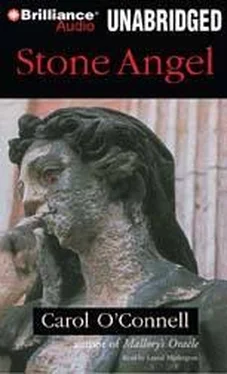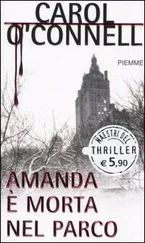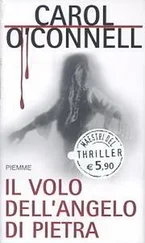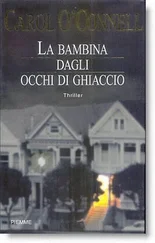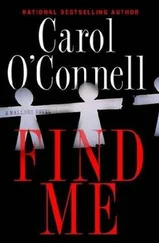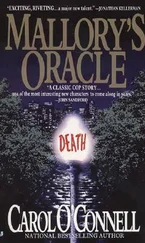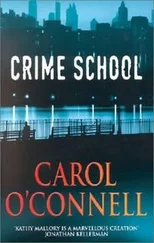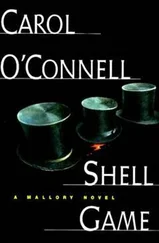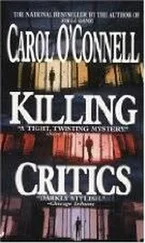Charles turned back to the alley in time to see Henry Roth emerge. The mute was smiling at the running woman’s back, as though pleased with some handiwork of his own. Charles had the feeling of something gone terribly wrong with the universe today. In the face of that woman’s extreme distress, Henry Roth’s smile was unnerving. This was simply not in the artist’s character, or what Charles had surmised of it.
Henry discreetly signed his farewell to Charles and walked off in the direction of his truck. And now it was the sculptor’s back that was marked. His departure was followed by the eyes of the man on the bench, the one who so resembled the late Babe Laurie. This man now turned his gaze back to Charles, and with only a nod, he renewed his invitation to sit down and pass the time.
But something was different. The man’s aspect had altered. Now the eyes were far from serene; they were alive with light. He wore the winning smile of a wild and handsome child. A lock of hair strayed over one eye, and he grinned to say he had a card trick Charles might like to see, or a secret he might want to know. Come to me, said the disarming face of a charming, barefoot boy of ten. We’ve got games to play, places to go.
So compelling was this silent call, Charles was made young again, and he was moving slowly toward the bench.
Then he stopped, as though he had met with a wall.
This was no shoeless, artless boy, but a grown man with heavy boots and an agenda involving subterfuge. Here was a polished actor with at least two personas.
Charles thought he had done well against the sheriff, but elected not to press his luck with a man who made an art form out of guile. So he nodded an acknowledgment, shrugged his apology, and turned toward Jane’s Cafe.
Aboveground phone lines and power cables were tucked away at the rear of the building. No jarring reminder of modern times marred its historical character. Even the wavy distortions in the window glass of Jane’s Cafe were true to the period. Near this window, the mother and son were seated at a table laid with a wine-red cloth and sparkling white napkins.
Charming.
However, when Charles entered the cafe, he found himself back in the correct era. A giant coffee machine gurgled in time to the music of soft rock. A gleaming metal and glass counter lined the back wall. Deep stainless-steel wells were filled with an amazing variety of salads, breads and cold cuts to be loaded on trays and paid for at the electronic cash register. All the white napkins were paper, and all the red tablecloths were washable, late twentieth-century plastic.
He collected a broad array of sandwich makings, condiments and salad greens on his tray. After paying for it, he settled down at the table next to Darlene and Ira Wooley. The woman was speaking to her son in a soothing mother voice, but the young man wasn’t listening. He was absorbed in constructing a tower of food on top of a slab of rye bread.
In a soft-spoken, one-sided argument, Darlene pointed to the items that would set off Ira’s allergies, and then she pulled out the offending layers. The boy stared at the mutilated sandwich for a moment, and Charles braced himself for the screaming fit common to autism. But Ira was very calm as he quietly disassembled the sandwich and began again with a new slice of bread from his mother’s tray. He worked deftly, despite bandaged hands and the splints on two fingers. Charles determined that there was nothing wrong with any of the motor skills, as Ira laid a precise line of sardines across a bed of mustard-slathered bread.
Darlene Wooley was looking at Charles with the suspicion common to overprotective mothers.
“Forgive me for staring,” said Charles. “Sandwiches are my hobby.”
Ira looked up for a moment as Charles spread mustard on pumpernickel and then embellished it with stripes of red from a pointed squeeze bottle of catsup.
Ira reached into his mother’s salad bowl and carefully picked out the carrot sticks and arranged them in a Crosshatch over his sardines.
Charles made a perfect circle of croutons on his stripes of catsup. Ira noted this and added a squared slice of ham on top of his carrots. Charles laid down two slices of bright yellow cheese, one layered askew over the other to form an eight-point star. Ira countered with a dollop of cream cheese spread over the ham in the rough smear of a triangle.
Though Darlene Wooley seemed very tired, she was smiling at the pair of them as they engaged in this conversation of sandwiches.
Charles stacked his ingredients faster and higher. Ira took up the challenge, finishing his own design first and crowning it with a slice of white bread.
Charles applauded the winner, and Ira’s laughing mother joined in, taking unreasonable delight in the moment. It must be an oasis in her day. He noted her bitten nails, the red veins of her eyes and the vertical worry line etched between her eyebrows. All the telling signs of life with an autistic child.
Well, her son’s mind was certainly alive. Wheels were turning, and quickly. Charles wondered if Ira was articulate. Many autistic people were not. They were as diverse as snowflake patterns in their behaviors; few generalizations would hold for all.
Ira was again absorbed in his food, and never looked up when his mother exchanged names with Charles and introduced her son. Ira’s eyes were looking elsewhere, not fixed on any point in the immediate universe.
When Charles had explained his interest in autism, he learned that eating lunch in the cafe was part of Ira’s behavior therapy, and he approved. This daily exercise would account for the lack of stress, despite the babble of conversation, the comings and goings, and the company of strangers.
“There’s no local program for autism, so four mornings a week, Ira goes to a state school for the mentally retarded.”
“Well, it’s miles better than no therapy at all,” said Charles. And it was common practice. A sympathetic doctor would alter the diagnosis of autism to that of retardation in order to utilize whatever program was available. “I imagine they use many of the same methods, learning skills through repetitive tasks?”
“Yes, and they do make a special effort with Ira. I tried to get him into a private program in New Orleans,” said Darlene. “But he couldn’t pass the screening test.”
Finally, the conversation turned to Charles’s business with the sheriff. “Augusta Trebec believes the young woman in custody might be Cass Shelley’s daughter. As the executrix – ”
“Well, who else could that girl be, Mr. Butler?”
When she became comfortable with calling him Charles, she recounted Mallory’s arrival in Dayborn on the day of the murder. “She stepped out of a cab in front of the bed and breakfast.”
Darlene had been sitting on the front porch, talking to her friend and neighbor, Betty Hale. “The girl was the very image of her mother. You couldn’t forget a face like that, even without the reminder of Cass’s angel in the cemetery.”
Babe Laurie had also seen Mallory, and reeled like a drunk, his eyes grown to the size of saucers. “So Babe sat there on the edge of the fountain while the girl was checking into Betty’s. Then his brother Malcolm came for him in the car. But Babe wouldn’t leave the square, and they got to arguing.”
Her son had slipped away and gone home to his house next door. “And then I hear Ira at the piano, and he’s playing this same little handful of notes, over and over. It drove Babe wild. He stormed into my house, with his brother right behind him. Well, I could not believe they had done that – just barged into my house. I was up from my chair and heading that way when the music stopped. And then my boy was screaming. The Lauries came out the door as I was going in. I found Ira at the piano with his hands smashed and blood running over the piano keys.”
Читать дальше
